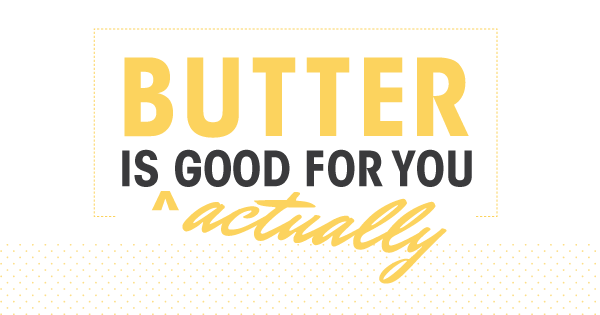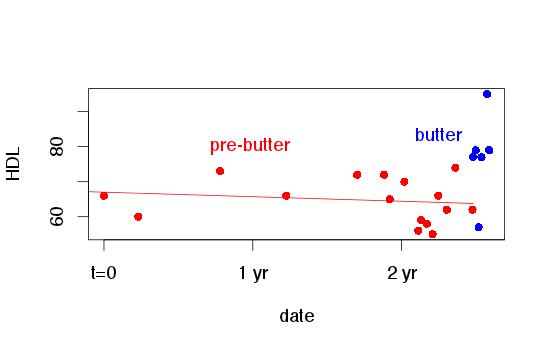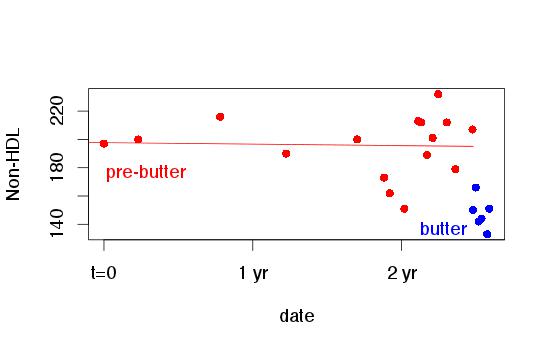Greg’s Butter Experiment: Did Butter Replace Statins For Him?

Statins are one of the most used drugs in the history of human existence. In 2008, $12.4 billion dollars worth of Lipitor was sold. In 2000, almost half of all patients with dyslipidemia (bad blood results) were taking a statin (this is despite a lack of clinical trials showing they help).
If you’ve been reading the blog for any length of time, you’ve probably heard me talk about the perks of quality fats – or at least grass-fed butter – before.
We’ll be writing more about statins in the future, but this article is going to talk about one man’s experience with an unlikely food: butter.
Greg’s Butter Experiment
A New York Lawyer named Greg decided to run an n=1 experiment. He started eating a half stick (56 grams) of butter a day to lower his cholesterol. He was careful and precise with his methods and even conducted a small statistical analysis of the results. I first learned of his experiment when Seth Roberts posted it on his blog.
Seth and I have been eating a stick of butter a day for quite some time – in my case I’ve been doing it since 2005. Greg took it a step further with his 1000-calorie omelet:
“In January I added half a stick of butter (about 57 grams) to my morning omelet. I first got this idea from Seth Roberts, who reportedly has been eating half a stick of butter per day for some time in order to increase his mental performance. Seth believes butter has been good for his heart. Dave Asprey also recommends eating lots of butter for brain health, among other reasons. My omelet consists of four pastured eggs, half a stick of Kerrygold Irish butter, and three tablespoons of coconut oil. That’s 1,076 calories, 110 grams of fat (75 grams from saturated fat) and 865mg of cholesterol. My diet otherwise stayed the same, though I was usually eating smaller portions of everything else.”
Greg tracked his cholesterol levels over time, and this is what happened:
- HDL (“good”) cholesterol went up by 19%
- Non-HDL cholesterol went down by 25%.
As a good scientist, Greg was careful to interpret the results with skepticism:
“I should point out that, for a variety of reasons, these are not high quality statistics. First of all, I have no formal training in statistics. Given that some data points were taken fairly close together in time, there is likely some serial correlation between measurements. I also made no particular effort to control for other variables. Finally, these results apply to me. There may well be people who respond differently and for whom butter is unhealthy. As with anything, it is always advisable to test things for yourself. So take this with a grain of salt. Or half a stick of butter, if you prefer.”
This isn’t as surprising as it seems. A Medical Research Council survey showed that men eating butter had a 50% reduced risk of developing heart disease compared to those using margarine.
Great researchers like Sally Fallon, Chris Masterjohn, and Stephan Guyenet have written extensively about the benefits of butter, especially when it comes to heart health. I believe that butyric acid from butter is one of the major reasons it achieves this effect. This article cites the effects of these so-called “heart healthy” polyunsaturated fats,
“The first randomized, controlled trial of dietary fat substitution was published in 1965. Substitution of corn oil for animal fat and carbohydrate doubled the number of major cardiac events. The results were not quite statistically significant, meaning there was a slight possibility they were due to chance. The researchers concluded “that under the circumstances of this trial corn oil cannot be recommended as a treatment of ischaemic heart disease. It is most unlikely to be beneficial, and it is possibly harmful.
A second trial found that replacing animal fats with polyunsaturated vegetable oils increased mortality by 39 percent. Rather than considering the possibility that the lipid hypothesis might be false, the investigators concluded that “men who have had myocardial infarction are not a good choice for testing the lipid hypothesis.”
Three other such trials found either no effect, or a small increase in mortality in the group consuming vegetable oil, which was not statistically significant.
The longest study on the effect of vegetable oil ever conducted was the Wadsworth Veterans Administration Hospital Study. The researchers randomized over four hundred men who were long-term inpatients to one of two dining halls. One hall used butter and the other used a mix of vegetable oils. The study was double-blinded and lasted over eight years. The researchers took care not to reuse the vegetable oil after cooking but took no such precautions with the butter, resulting in butter that was very deficient in vitamin E. There were also twice as many heavy smokers and 60 percent more moderate smokers in the butter group. The group consuming butter had 50 percent more cardiovascular deaths. The group consuming vegetable oil, however, had more atherosclerosis than the control group and in the last few years of the study began experiencing a marked increase in the risk of cancer. Total mortality was slightly higher among those consuming vegetable oil, but the difference was not statistically significant.”
Don’t Forget About Cholesterol
Chris Masterjohn has contributed an extensive amount of research on cholesterol, one of the most misunderstood chemical compounds in science today. For decades now we have been told that cholesterol is bad and it will give you a heart attack but the opposite is actually true. Cholesterol is good, it helps brain function, and it will increase HDL and reduce LDL, which decrease your chance of a heart attack.
If you simply google “benefits of cholesterol” you will run into a tidal wave of important information that most people don’t even know of, and make sure to check out the Bulletproof Radio episodes.
That said, a larger sample size would be nice (and there’s nothing wrong with trying it). Here is the recipe for Greg’s 1000-calorie omelet, if you want to give this experiment a try:
- 4 pastured eggs.
- 56 grams of Kerrygold butter.
- 42 grams of coconut oil.
Let us know the results in the comments section of this post.
In the meantime, I’m going to eat more butter. 🙂



